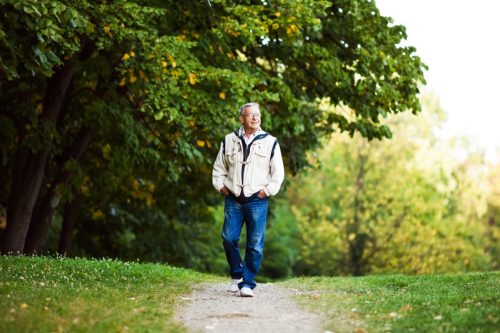Taking a “Smell Walk” Slashes Stress and Boosts Your Mood—Here’s How to Do It

Walking is one of the best forms of exercise you can do at any age: It’s low-impact and doesn’t require any equipment aside from a reliable pair of sneakers, and, as a bonus, it gets you outside to explore the world around you. But while you might take note of the sights, sounds, and weather as you go for a stroll around the neighborhood, therapists say you should also stop and smell the roses—and everything else around you. In fact, going on a “smell walk” can boost your mood and slash your stress levels. Read on to find out how you can take one.
RELATED: 8 Ways to Motivate Yourself to Take a Daily Walk.
What is a “smell walk”?

A “smell walk” is pretty much exactly what it sounds like—a walk where you are engaging with the scents of the world.
“A smell walk is a mindfulness experience focused on the sense of olfaction,” says clinical psychologist Carla Marie Manly, PhD, author of Joy from Fear. “When we give our attention to specific sensory input such as the smells in our environment, we are naturally focused on the present rather than the past or future. The experience of a smell walk allows us to detach from the racing, busy mind and focus on the various scents in our environment.”
You can take one of these walks anywhere, but the key is not solely focusing on getting from point A to point B.
“The idea is to take in your surroundings and soak them in,” explains Abbey Sangmeister, LPC, approved clinical supervisor (ACS), entrepreneur, psychotherapist, and burnout coach. “Often we aren’t even paying attention to the path we are on, only trying to get to the destination. Smell walks encourage slowing down and having a goal in that slow, patient walk.”
RELATED: 5 Signs You Need to Toss Your Walking Shoes, Podiatrists Say.
It can be a beneficial form of meditation.

If you struggle with traditional meditation, a smell walk can serve as an active form of the practice, helping you achieve a similar state of mindfulness.
“A lot of people think of meditation as sitting still, being quiet, and silencing their minds. That is the old-school Hollywood version of meditation. I teach my clients to use exercise for meditation,” Matthew Schubert, mental health counselor and operator of Gem State Wellness, tells Best Life. “A smell walk is the perfect example of this. Get outside, get moving, be present in the moment, and smell the roses!”
Even better, Manly explains that by focusing on the present moment during a smell walk, you can also decrease your stress and anxiety.
“When we become absorbed in noticing any specific sensory input—such as the smells wafting around us—our focus is naturally taken away from life’s stressors and challenges,” she shares. “Walking itself has mood-boosting benefits, yet some of the beneficial aspects can be lost when we get distracted by unwanted thoughts or distracting background noise. When we add a component of mindfulness to our walks—such as intentionally noticing scents in the air—the immersive nature of the experience can do a world of good for physical, mental, and emotional health.”
RELATED: 25 Amazing Health Benefits of Walking.
Biology is involved, too.

According to Olivia Dreizen Howell, clinical hypnotherapist, NLP, and certified life coach, our subconscious mind is influenced by smells due to the connection between the olfactory system (your sense of smell) and the brain’s limbic system. So taking a deep breath of the air around you is more beneficial than you think.
“The olfactory system, otherwise known as the way we smell and internalize scents, is a large part of the way our subconscious mind creates our internal representation of the world—our memories, our behaviors, our decision making, is all impacted and influenced by the smells around us!” Howell explains. “As our brain can only process a certain amount of information at a time, it’s important to choose which information is being processed carefully, and that’s why smell walks are so important to our mind, body, and soul. Smells, though we don’t realize it, are internalized in our subconscious, and our subconscious actually affects the way we behave, act, and feel.”
Howell notes that this connection might be why you feel “safe and loved” when you inhale the scent of something comforting, like freshly baked cookies.
For more wellness advice delivered straight to your inbox, sign up for our daily newsletter.
Here are some tips for taking yourself on a smell walk.

If you’re ready to embrace the benefits of a smell walk, first start by getting outside. Sangmeister notes that you don’t need to head for greener pastures to get the most out of your experience, and you can go for a walk anywhere, whether that’s the beach, the city, or the woods. Your walk can also be as short or as long as you want.
Manly says that once you’re outside, you should tune into your surroundings—and maybe skip music or podcasts so you can really focus on the aromas around you.
“As you walk, imagine closing your eyes and ears—this will allow you to focus on your sense of olfaction as you notice scents in the air,” she says. “At first, your sense of smell might be a bit dull, yet the more you practice tuning into the smells around you, the more you’ll discover an incredible variety of scents just waiting to be noticed.”
You might also get a mix of scents—including those that are somewhat unpleasant—but keep in mind, it’s all part of the experience.
“Although you might hope to encounter only delightful flower scents or luscious food aromas, open yourself to noticing and non-judgmentally appreciating even those not-so-delightful smells,” Manly suggests. “The more you immerse yourself in the experience of a scent walk, the more you’ll find yourself enjoying the gift of your senses and the world around you.”